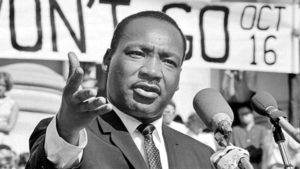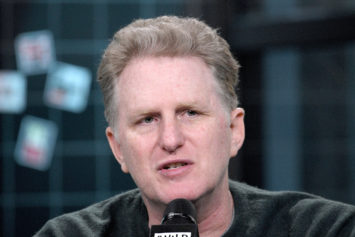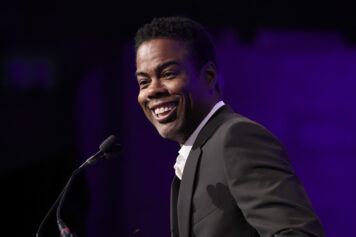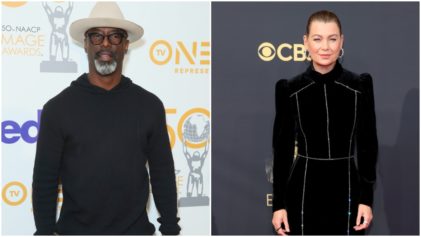
Slain civil rights activist and proponent of non-violence, Dr. Martin Luther King Jr.
This month marks the 49th anniversary of Dr. Martin Luther King Jr.’s assassination. Exactly one year before his murder, the Morehouse University alumnus publicized his opposition to the Vietnam War at New York’s Riverside Church. Dr. King told the congregation that his devotion to nonviolence would no longer permit him to minister to Black people that “Molotov cocktails and rifles would not solve their problems,” while saying nothing about the United States’ military plunder in Southeast Asia. He submitted his life as proof of his belief that nonviolence was the only path to justice.
Many Black people and others harbor the highest regard for Dr. King, while rejecting his idea of nonviolence. Charles Cobb Jr., a member of the upstart 1960s Student Nonviolent Coordinating Committee (SNCC), writes about Black citizens with this very mentality in “This Nonviolent Stuff’ll Get You Killed: How Guns Made the Civil Rights Movement Possible.” He brilliantly illustrates legends like Mississippi’s Hartman Turnbow, a farmer and community organizer who celebrated the work of nonviolent activists but refused to travel without a gun. Turnbow remained a straight shooter and explicitly informed Dr. King, “This nonviolent stuff ain’t no good.”
After a hearty chronicle of 1960s Black self-defense, Cobb concludes the text by lamenting the lack of “nonviolent grassroots effort in America’s most violence-wracked communities.” He reminds readers that Dr. King’s tactic was not exclusively for use against racists. Practicing nonviolence with other Black people could be a powerful strategy to eliminate self-destructive behaviors along with the canned rebuke to all charges of police racism, Black-on-Black violence.
Cobb noted, “Nonviolence may be worth reconsidering [in order to] chip away at this culture of violence,” mandated by the system of white supremacy. Military aggression and lethal force are consistently modeled as preferred methods of resolving conflict. This helps inform why Black residents of Chicago and Baltimore suffer modern holocausts with murder rates live-updated like national debt numbers.
In addition to rejecting physical force, Dr. King’s brand of nonviolence called for acute verbal hygiene. The preacher’s son understood fists and words can inflict violence.
Black Panther Party for Self Defense member, Assata Shakur’s memoir describes how her school teachers “made war sound so glorious, so heroic.” The future Panther and her Black classmates waged their own battles after school, brawling over “petty disputes” and verbal insults. “We would talk about each other’s ugly, big lips and flat noses. We would call each other pickaninnies and nappy-haired so-and-so’s,” recalls Shakur. Generations of white racism contaminated many Black people with toxic levels of self-hate, often demonstrated in callous treatment.
Dr. King’s philosophy could do much to foster healthier, less-noxious communication between Black people. Media personality and author Tavis Smiley’s biography on the slain preacher details various instances where Black people publicly ridiculed Dr. King’s tactics and adherence to nonviolence. “Doc” turned the other cheek, declined to return their insults. Smiley describes a variety of instances when U.S. Congressman Adam Clayton Powell Jr. openly disparaged Dr. King, including once in 1968, weeks before the assassination, when he gathered the press to declare, “The day of Martin Luther King is dead.” Smiley emphasizes that Dr. King repeatedly abstained from retaliating and made time in the months before his death to pen the congressman a letter of encouragement.
Dr. King’s admirable refrain is untenable to many Black people who think tongue-lashing wayward Black people is necessary for progress. A different contemporary of Dr. King and a fellow minister, Malcolm X is often cited for his unfiltered putdowns of Black leaders. Cobb retrieves Malcolm X’s 1963 speech where he “denounced Marin Luther King Jr. as a modern Uncle Tom subsidized by whites “to teach the Negroes to be defenseless.” The former Nation of Islam apostle didn’t exclusively target Dr. King and accumulated a heap of verbal smack downs on an array of 1960’s Black entertainers, politicians and activists.
What’s often minimized is following his departure from the NOI and his pilgrimage to Mecca, Malcolm greatly reduced his public attacks on well-known Black people. He met Coretta Scott King in 1965, weeks before his own murder, and impressed Dr. King’s wife with his humility and sincere desire to help. Discarding the counterproductive verbal jousting sooner could have allowed for greater common focus on a common problem.
Echoing Dr. King’s sentiments, North Carolina Central University faculty member and author Dr. Yaba Blay emphasizes that centuries of white terrorism “trained” us to be combative, to be “unable to relate to each other.” Making a conscious commitment to treat all Black people people with physical and verbal nonviolence is a profound application of Dr. King’s concept of “radical love.” It doesn’t require endorsing the views and conduct of every Black person, just a recognition that minimizing conflict with other Black people is an exponential asset in the business of ending racism.
The thought of accepting all varieties of white violence without retaliation is rightfully repugnant to most. But, committing to physical and verbal nonviolence exclusively with other Black people could be a legitimate means of mending our fractured relationships and nourishing the Black self-respect necessary to complete “Doc’s” goal.
Gus T. Renegade hosts “The Context of White Supremacy” radio program, a platform designed to dissect and counter racism. For nearly a decade, he has interviewed and studied authors, filmmakers and scholars from around the globe.


